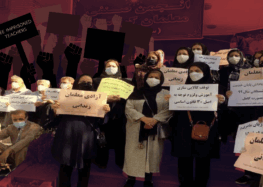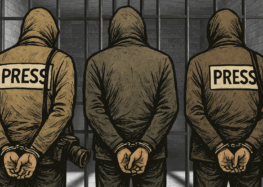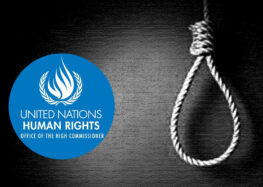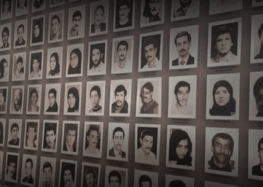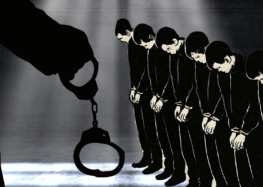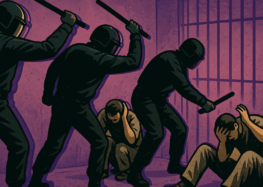Scores of Political Prisoners Will Be Executed in Iran Without an International Outcry
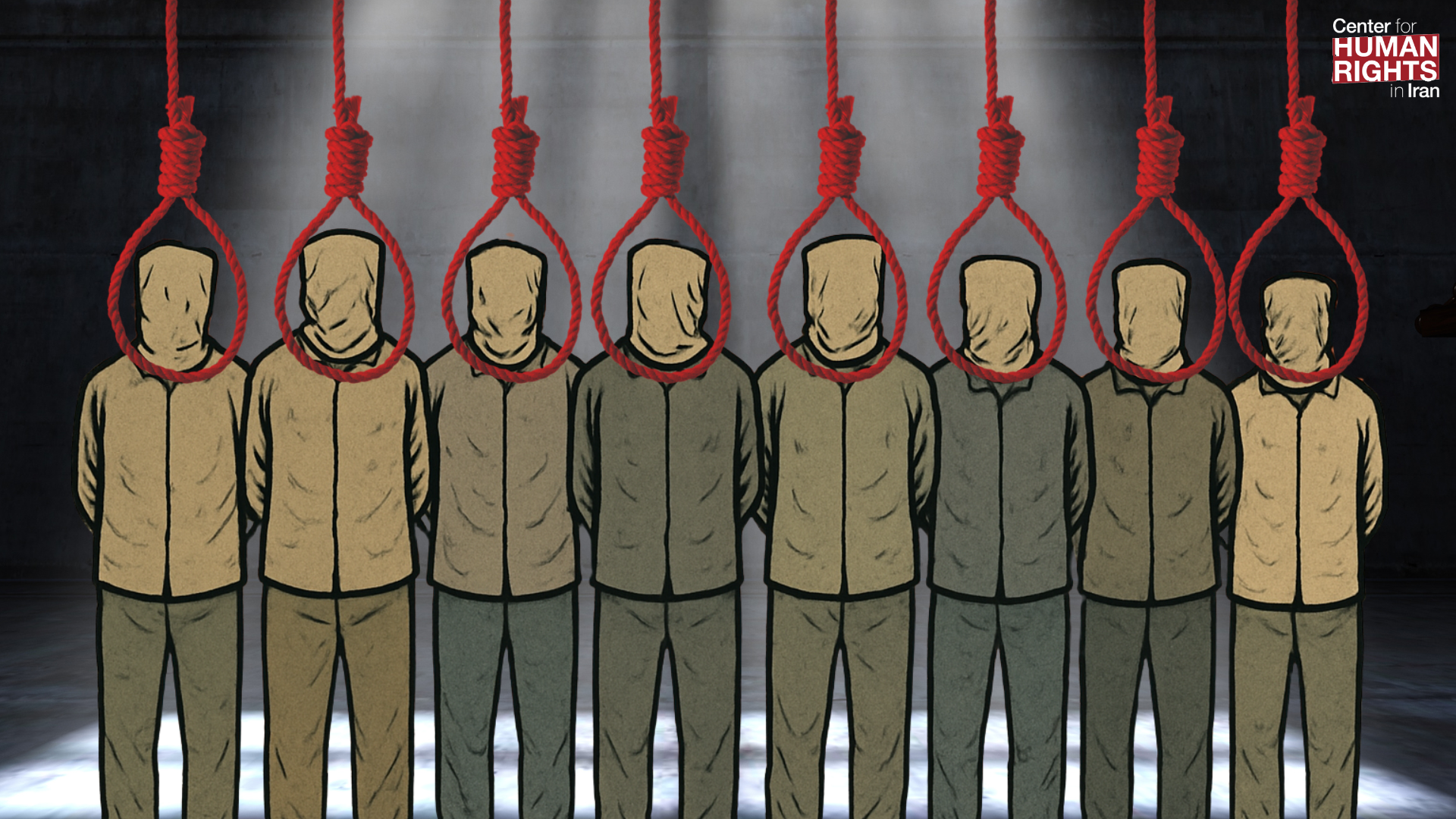
Numerous Prisoners at Imminent Risk as International Attention is Focused Elsewhere
Governments Must Demand a Halt to Iran’s State-Sanctioned Killing
Editor’s note: This article has been amended on August 21, 2025, to include an additional political prisoner, Pakhshan Azizi, who is at imminent risk of execution.
August 21, 2025 — The imminent risk of execution of at least ten political prisoners in Iran, and the high risk of execution of nearly 70 others—all after grotesquely flawed judicial proceedings marked by fabricated charges, lack of evidence, denial of counsel and due process rights, torture, and forced false confessions—is a human rights emergency that the international community should be aggressively addressing in all diplomatic channels and forums, the Center for Human Rights in Iran (CHRI) said today.
The ten political prisoners who are known to be at imminent risk are among at least 66 people in Iran who have been handed death sentences in political and security cases and thus face the risk of execution.
This number includes 20 protesters arrested during the November 2019 protests and the 2022 Woman, Life, Freedom protests, 37 prisoners of conscience, eight accused of espionage, and one charged with blasphemy, according to Iran Human Rights (IHRNGO), which documents death penalty cases in the country.
“The Islamic Republic has learned it can hand out death sentences at will, and hang its alleged critics without so much as a whisper of protest amongst the community of nations, let alone any real consequences for these unlawful killings,” said Hadi Ghaemi, CHRI’s executive director.
“As a result, these executions are surging in number in Iran, used against political prisoners without evidence, defense, or due process by a judiciary that has been weaponized to silence dissent,” Ghaemi said.
“These executions in Iran are nothing less than state-sanctioned murders based on fabricated charges, coerced confessions, and secret proceedings. They constitute grave and irreversible human rights violations, and the absence of sustained international pressure has allowed the Islamic Republic to continue these killings with impunity,” Ghaemi added.
Political Prisoners at Risk of Imminent Execution
There are dozens of political prisoners in Iran already facing death sentences and at serious risk of execution, and many more who have been charged with crimes that can carry the death penalty, whose sentences have not yet been announced. (Iran has many vague political and religious charges that can carry the death penalty, such as “spreading corruption on earth” and “cursing the Prophet,” which are frequently used in political cases despite their impermissibility under international law.)
Yet of most immediate concern are those political prisoners on death row who have exhausted all appeals and/or have been transferred to known execution sites and now face imminent risk of execution at any time.
CHRI is deeply concerned over ten political prisoners who are at imminent risk of execution, including seven who were recently forcibly transferred to Ghezel Hesar Prison, as this facility is one of the main sites used by the Islamic Republic for executions, including secret hangings, as well as two women whose death sentences have been upheld by the Supreme Court, and an imprisoned dual national who has been forcibly disappeared and whose whereabouts are unknown. These prisoners are:
- Akbar (Shahrokh) Daneshvarkar
- Mohammad Taghavi Sangdehi
- Pouya Ghobadi
- Vahid Baniamerian
- Babak Alipour
- Abolhassan Montazer
- Babak Shabazi
- Sharifeh Mohammadi
- Pakhshan Azizi
- Ahmadreza Djalali
Political Prisoners Transferred to Execution Site
Daneshvarkar, Sangdehi, Ghobadi, Baniamerian, and Alipour were forcibly moved from Greater Tehran Penitentiary to solitary confinement in Ghezel Hesar Prison on August 7, 2025. Authorities had previously attempted to transfer them on April 16, but resistance from fellow prisoners blocked the move. Following Israeli attacks on Evin Prison during the June 2025 Israel-Iran war, the five were temporarily moved to Greater Tehran Penitentiary. While hundreds of other prisoners were being returned to Evin on August 8, these five political prisoners were forcibly sent to Ghezel Hesar, which is the primary site for executions in Tehran and Alborz provinces, raising fears that these prisoners’ death sentences may be carried out at any time.
There are also fears of secret executions, as on July 27, political prisoners Behrouz Ehsani and Mehdi Hassani were secretly executed at the same facility without any prior notification to their families or lawyers.
The five men were sentenced to death in a six-defendant case for “armed rebellion against the state” in October 2024, following a grossly unfair trial marked by due process violations, including torture to extract forced “confessions.” The sixth defendant, Abolhassan Montazer, also sentenced to death, had earlier been transferred to Ghezel Hesar under the pretext of medical treatment.
Babak Shabazi, meanwhile, was sentenced to death following fabricated charges and gross judicial abuses. Shahbazi, 44 and father of two, was held in prolonged solitary confinement for over four months, repeatedly subjected to torture and forced to sign fabricated confessions. His family’s chosen lawyer was barred from representing him, and the court-appointed lawyer was denied access to his case file. His case was presided over by Judge Abolghasem Salavati, a figure notorious for presiding over politically motivated trials, issuing draconian sentences, and committing severe rights violations.
The Supreme Court rejected Shahbazi’s request for judicial review and upheld his death sentence in early August 2025, ignoring the blatant violations of his legal rights committed throughout his prosecution.
On August 8, 2025, Shabazi was transferred to Ghezel Hesar Prison. Since his transfer, communication between Shahbazi and his family has been cut off, raising fears that his execution could be carried out imminently and in secret.
Female Labor Activist’s Death Sentence Upheld by the Supreme Court
In addition, female labor activist and women’s rights defender Sharifeh Mohammadi is also at imminent risk of execution, after Branch 39 of Iran’s Supreme Court upheld her unjust death sentence on August 16, 2025.
Mohammadi, a 45-year-old industrial design engineer and mother of a 13-year-old son, was arbitrarily arrested by agents of the Ministry of Intelligence on December 5, 2023, and held incommunicado for months, denying her family any information about her status, condition, or whereabouts solely in retaliation for her peaceful activism. She was handed a death sentence following a sham trial marked by torture, forced “confessions,” and grave due process violations.
In an interview with Shargh newspaper, Mohammadi’s lawyer, Amir Raisian, stated: “Branch 39 of the Supreme Court, which had previously overturned Sharifeh Mohammadi’s death sentence, has this time upheld the verdict despite all the remaining ambiguities and flaws in the case.”
Mohammadi was initially sentenced to death for “armed rebellion” by Branch 1 of the Rasht Revolutionary Court. Branch 39 of the Supreme Court later overturned the ruling, citing lack of evidence linking her to armed activity, insufficient proof of membership in a designated organization, and flaws in the investigative report. However, Branch 2 of the Rasht Revolutionary Court reissued the death sentence, relying solely on the security agents’ report.
Mohammadi’s lawyer, Raeisian, criticized the Supreme Court for upholding the sentence despite the legal flaws. “The verdict of Branch 2 of the Rasht Revolutionary Court was merely a repetition of the previous ruling of Branch 1, issued without addressing the Supreme Court’s concerns and solely based on the security agents’ report,” he said. “Therefore, it was expected that the Supreme Court would again overturn the ruling, but unexpectedly, it did not.”
Female Kurdish Activist’s Death Sentence Upheld by the Supreme Court
Kurdish political prisoner Pakhshan Azizi, a 41-year-old Kurdish humanitarian worker and civil society advocate, faces imminent execution after Iran’s Supreme Court rejected her second appeal without reviewing critical trial documents.
Azizi, born in Mahabad, northwestern Iran, was violently arrested at her home in Tehran on August 4, 2023. Her family members were also detained and later sentenced to one year in prison each for “assisting a criminal to escape trial and conviction.” During her detention, Azizi was denied legal counsel, subjected to severe psychological and physical torture, including five months of solitary confinement and prolonged interrogation sessions designed to extract false confessions.
She was sentenced to death in June 2024 by Branch 26 of the Tehran Revolutionary Court on charges of “armed rebellion through membership in opposition groups.” The Supreme Court upheld the ruling in January 2025 and dismissed a second appeal in April 2025.
“[The Supreme Court] ignored the flaws in the investigation and paid no attention to evidence that showed Ms. Azizi’s case does not merit the death sentence, and that her activities in refugee camps in northern Syria and other locations for people displaced by the war with ISIS, were peaceful activities that had no political dimensions and centered around providing aid to victims of ISIS attacks,” Azizi’s lawyer, Amir Raesian told Shargh newspaper.
Azizi’s case stems from her humanitarian efforts in refugee camps in northern Syria and Iraq, where she provided aid to people displaced by the war with ISIS. Azizi’s lawyer had posted multiple letters from international civil society organizations active in the affairs of refugees in Syria’s Kurdish region that confirmed her work with them as a relief and social worker was non-political and focused solely on aiding victims of conflict.
UN experts have stated that Azizi’s prosecution “reflects the heightened persecution that minority women activists face in Iran and the continued intention to punish and silence them by creating a climate of fear.” They urged Iranian authorities to revoke her death sentence and investigate allegations of torture and denial of fair trial rights.
Swedish-Iranian National at Grave Risk of Execution After Months of Forced Disappearance
At the same time, there is tremendous concern regarding the imminent risk of execution of Ahmadreza Djalali, a Swedish-Iranian doctor and academic sentenced to death in Iran. He is still missing almost two months after he was transferred from Evin to the Greater Tehran Penitentiary following the Israeli attack on the prison on June 23, and subsequently transferred to an unknown location.
In a statement, his wife, Vida Mehrannia, said the family has had no contact with him since June. “No calls, no messages—only silence. We’re facing growing fear and uncertainty about his situation and whereabouts,” she wrote.
Djalali, arrested in 2016 during an academic trip to Iran at the invitation of the University of Tehran, was accused of “enmity against God through espionage for Israel” and sentenced to death following a grossly unfair trial based on “confessions” extracted under torture. For nearly a decade, he has endured prolonged solitary confinement, torture, and the denial of critical medical care.
CHRI is extremely concerned that after nearly two months of disappearance, Iranian authorities may carry out his execution in secret, as they have done in previous dual-national cases.
Letter from Political Prisoner Babak Shahbazi Details Kafkaesque Judicial Abuses
Political prisoners are systematically denied any semblance of due process or fair trial rights, and are routinely convicted on the basis of false “confessions” extracted under torture. Moreover, such prosecutions are used to convict in capital cases, with political prisoners being sent to the gallows after gross violations of their legal and human rights and sham trials.
In a last-ditch effort to save his life, political prisoner Babak Shahbazi, wrote a letter detailing the severe and repeated judicial violations he has suffered since his arrest on January 6, 2024, to Iran’s Judiciary Chief Gholamhossein Mohseni Ejei.
The actions described in Shahbazi’s letter—the torture, falsified confession, and imposition of a death sentence without trial transparency, access to counsel, or the opportunity for defense—represent a grave miscarriage of justice, and severely violate the guarantees of a fair trial as outlined under international human rights law, including the International Covenant on Civil and Political Rights (ICCPR), to which Iran is a State Party.
Most troubling, the abuses detailed in his letter are emblematic of the severe rights violations political prisoners are routinely subjected to in the Islamic Republic. Extensive excerpts of his letter, addressed to Head of the Judiciary Gholamhossein Mohseni Ejei, follow:
I was arrested on January 6, 2024. I spent four and a half months in solitary confinement and three months in a general detention facility, and on August 19, 2024, I was transferred to Ward 4 of Evin Prison. Later, I was interrogated for 41 days in a safe house.
On February 16, 2024, they brought me a file of about 200 pages, which they had forced and deceived me into writing, and demanded I sign and fingerprint it. Since I had not committed any of the alleged acts, I refused. Among those papers, they had even inserted sheets they themselves had written. When I objected, they became angry and claimed I had written them. After I showed the differences in handwriting, they quickly hid the papers and said they only wanted to test me.
Judge Salavati tried, through threats and inducements, to force me to sign a statement claiming that I had collaborated with Mossad for two years. He said I had planted bombs and listening devices at the General Staff of the Armed Forces. Later, he admitted himself that after searches, nothing was found. He then accused me of having given Mossad the location of Iran’s war room in Zarand, Kerman—even though I do not even know where Zarand is. At one point, he even claimed that my daughter was a leader of the 2009 unrest, but their information was incorrect, as my daughter was born in 2007.
Regarding my presence at the General Staff and the Ministry of Intelligence, first, their operations were still under construction and not yet active. Second, both places are equipped with hidden cameras. So if nothing appears on the cameras, how can they claim I committed these acts?
Furthermore, I was held for 14 days in the detention center of the Armed Forces Judiciary Organization, where I was connected to a lie detector, and it proved that I had not lied.
My family has also been placed under pressure, and officials have even told all my relatives that I will be sentenced to death. Now, they have issued a death sentence against me without a written verdict, without informing me or my lawyer, and without even an oral acknowledgment in court. Such actions have shattered my life.
International Community Must Recognize Severity of Crimes Being Committed in Iran
The Islamic Republic’s execution of increasingly large numbers of political prisoners—all without due process or fair trials—constitutes severe violations of international law, including treaties to which Iran is a State Party and bound.
Saeid Dehghan, a prominent Iranian human rights lawyer and director of the Parsi Law Collective, talked with CHRI about the urgent need for the international community to recognize the severity of the crimes being committed by the Islamic Republic in the context of the executions of these political prisoners.
Dehghan noted that secret executions and enforced disappearances (for example, in cases such as Ahmadreza Djalali) constitute serious violations of Articles 6, 7, 9, and 14 of the ICCPR. While Iran is not a party to the International Convention for the Protection of All Persons from Enforced Disappearance, the prohibition on enforced disappearance is a peremptory norm of human rights law and, at a minimum, amounts to multiple violations of Iran’s ICCPR obligations.
In addition, the “Safeguards Guaranteeing Protection of the Rights of Those Facing the Death Penalty” (ECOSOC 1984/50), the “Nelson Mandela Rules” on the treatment of prisoners, and the “Minnesota Protocol” on the investigation of potentially unlawful deaths all emphasize transparency, timely notification of family members and lawyers, prohibition of torture, and independent investigations. Dehghan stressed that all of these requirements are being systematically ignored and violated in the Islamic Republic. He noted that:
“Given the widespread and systematic nature of state killings and torture, there is scope to frame these as crimes against humanity (murder, torture, persecution on political grounds) in certain jurisdictions. In addition, recent precedents in Europe—such as the prosecution of Hamid Nouri in Sweden—demonstrate that universal jurisdiction (UJ) is also both practical and effective.”
Dehghan added that there was an urgent need to activate multiple UN mechanisms simultaneously to directly address these severe crimes, such as the Special Rapporteur on the situation of human rights in Iran, the Special Rapporteur on extrajudicial executions, the Special Rapporteur on torture, the Working Group on Arbitrary Detention, and the Independent Fact-Finding Mission on Iran mandated by the Human Rights Council. He also noted that a special session of the Human Rights Council and a push for a politically binding resolution demanding the immediate suspension of executions were urgently needed.
CHRI urgently calls on the UN, governments worldwide, and international human rights organizations to:
- Demand an immediate halt to the execution of Babak Shahbazi, Akbar (Shahrokh) Daneshvarkar, Mohammad Taghavi Sangdehi, Pouya Ghobadi, Vahid Baniamerian, Abolhassan Montazer, Babak Alipour, Sharifeh Mohammadi, and Pakhshan Azizi.
- Demand immediate transparency regarding the condition and whereabouts of Swedish-Iranian dual-national Ahmadreza Djalali, and his immediate, unconditional release.
- Condition bilateral political and economic engagement with the Islamic Republic on the suspension of executions and the provision of consular and medical access.
- Provide emergency protection mechanisms for families and lawyers involved in these cases, and facilitate humanitarian visas for relatives at risk.
- Impose Magnitsky-style sanctions on all officials implicated in rights abuses, including judges, prosecutors, security officials, and prison administrators responsible for unlawful and/or secret executions.
- Encourage prosecutors in countries with Universal Jurisdiction legislation to open cases against perpetrators of torture, enforced disappearance, and state killings, while ensuring protection for victims and witnesses.
- Call for a full, independent, and transparent review of all 66 political and security death penalty cases;
- Demand that the Iranian authorities adhere to international standards regarding due process and fair trial rights, and to the prohibition against torture and forced confessions;
- Call for an immediate moratorium on the death penalty until the Islamic Republic adheres to all international standards regarding capital punishment, including its use only in the “most serious” crimes and with full due process, and its prohibition against juvenile executions.
Without International Pressure, More Political Prisoners Will Be Executed in Iran
“Political prisoners in Iran are being hanged on the basis of fabricated charges, torture, forced false confessions, and opaque judicial proceedings that violate every basic standard of law and justice, and with barely a murmur of international protest,” said Ghaemi.
“This is a test of international resolve. Silence now will cost these prisoners their lives—and embolden further abuses by the Islamic Republic under the cover of so-called law,” Ghaemi added. “Immediate international action is required to save them.”
List of Protesters at Risk of Execution
Protesters have been increasingly singled out for harsh punishment—including the death penalty—after Iran was rocked by sustained nationwide protests in November 2019, and again in 2022-23, with the Woman Life Freedom protests. Peaceful protesters are typically charged with unsubstantiated violent or national security-related crimes, prevented from mounting a defense in court with independent counsel, and convicted on the basis of fabricated evidence or “confessions” extracted under torture.
The following protesters listed below are at risk of retaliatory executions to suppress further uprisings amid the post-war crackdown in Iran.
1. Abbas Deris was arrested during the November 2019 nationwide protests on December 8, 2019, and sentenced to death on the charge of enmity against God, which was upheld by the Supreme Court. After the rejection of his appeal, his lawyers filed another appeal, which is still pending. He is held in Mahshahr Prison.
2. Ali (Souran) Ghasemi, a Kurdish Woman, Life, Freedom protester arrested in April 2023, was sentenced to three death sentences by Branch 1 of the Urmia Revolutionary Court, presided over by Judge Reza Najafzadeh in July 2025. He is held in Urmia Central Prison.
3-8. Alireza Barmazpournak, 27, Alireza Kafayi, 35, Amir Mohammad Khosheghbal, 26, Hossein Nemati, 27, Milad Armoun, 26, Navid Najaran, 33, are protesters arrested during the Woman, Life, Freedom protests on November 3, 2022, in the “Ekbatan Case,” and sentenced to qisas (retribution-in-kind) for the alleged murder of an IRGC officer by Branch 13 of the Tehran Criminal Court on November 13, 2024, though the branch head issued a dissenting minority vote. The defendants in the case were subjected to torture and ill-treatment to extract false self-incriminating confessions that were later aired by state media. They are currently in Ghezel Hesar Prison.
9. Farshid Hassanzehi, a 25-year-old Baluch protester was arrested during the Woman, Life, Freedom protests on November 24, 2022. Despite having an alibi confirmed by his employer, he was tortured into false confessions and tried online without a lawyer. He was sentenced to death (qisas) by Branch 1 of the Zahedan Criminal Court on November 12, 2023. He is currently held in Zahedan Central Prison.
10. Fazel Bahramian, a Woman, Life, Freedom protester, was arrested on December 31, 2022. He was charged with moharebeh (enmity against God) and was sentenced to death on January 27, 2024, a verdict that was upheld by the Supreme Court two days later. There is limited information about his current location.
11. Kaveh Salehi, a 44-year-old Kurdish Woman, Life, Freedom protester, was arrested in April 2023 and tortured to extract confessions that were later used against him. He is currently held in Urmia Central Prison. He was sentenced to three death sentences by Branch 1 of the Urmia Revolutionary Court, presided over by Judge Reza Najafzadeh, in July 2025 on charges of “armed rebellion,” “enmity against God,” and “leading and forming a rebel group.”
12. Mehrab Abdollahzadeh, a 27-year-old Kurdish barber and Woman, Life, Freedom protester, was arrested on October 22, 2022, and tortured for 42 days to force confessions over the death of an IRGC member. He was sentenced to death for corruption on earth by Branch 1 of the Urmia Revolutionary Court, presided over by Judge Najafzadeh, on September 19, 2024. He is held in Urmia Central Prison, and his case is under Supreme Court review.
13. Mehran Bahramian was arrested on December 31, 2022, during the Woman, Life, Freedom protests. He was charged with enmity against God and sentenced to death on January 27, 2024, with the Supreme Court upholding the verdict two days later. Limited information is available about his case or location.
14. Mohammad Darvish Narouyi, a 22-year-old Baluch citizen, was arrested during the Woman, Life, Freedom protests in January 2023. He was subjected to torture to force confessions, denied medical care, and access to a lawyer. He was charged with enmity against God and corruption on earth and sentenced to death by the Zahedan Revolutionary Court on June 16, 2025. He is held in Zahedan Central Prison.
15. Mohammad Javad Vafayi-Sani, a 29-year-old boxing champion, was arrested in February 2020 in connection with the November 2019 nationwide protests and tortured to force confessions. Unable to afford his bail of 30 billion tomans, he remained detained. He was charged with corruption on earth and sentenced to death, a sentence overturned twice by the Supreme Court, and he was resentenced to death for the third time in September 2024. He is held in Mashhad Central Prison.
16. Mohammad Mehdi Soleimani was arrested on September 23, 2022, during the Woman, Life, Freedom protests. He was charged with the murder of an IRGC member and sentenced to death, among other prison and monetary sentences. He is held in Mashhad Central Prison.
17. Pejman Soltani is a 32-year-old Kurdish protester arrested on April 15, 2023, during the Woman, Life, Freedom protests and tortured to force confessions that were broadcast by state media. He was sentenced to three death sentences by Branch 1 of the Urmia Revolutionary Court, presided over by Judge Reza Najafzadeh, in July 2025 for multiple charges, including armed rebellion and enmity against God. He is held in Urmia Central Prison.
18. Rezgar Beigzadeh Babamiri, a 47-year-old Kurdish father, was arrested on April 17, 2023, for providing medical assistance to Woman, Life, Freedom protesters. He was subjected to severe torture, and his coerced confessions were later aired by state media. He was sentenced to two death sentences by Branch 1 of the Urmia Revolutionary Court, presided over by Judge Reza Najafzadeh, in July 2025. He is held in Urmia Central Prison.
19. Teifour Salimi Babamiri, a Kurdish Woman, Life, Freedom protester, was arrested in April 2023 and tortured to extract confessions. He was sentenced to two death sentences by Branch 1 of the Urmia Revolutionary Court, presided over by Judge Reza Najafzadeh, in July 2025. He is held in Urmia Central Prison.
20. Yassin Kabdani, a 21-year-old Baluch citizen, was arrested in January 2023 during the Woman, Life, Freedom protests. He was tortured to force confessions, which were aired by state media, and denied medical care and access to a lawyer. He was charged with enmity against God and corruption on earth and sentenced to death by the Zahedan Revolutionary Court on June 16, 2025. He is held in Zahedan Central Prison.
This report was made possible by donations from readers like you. Help us continue our mission by making a tax-deductible donation.

